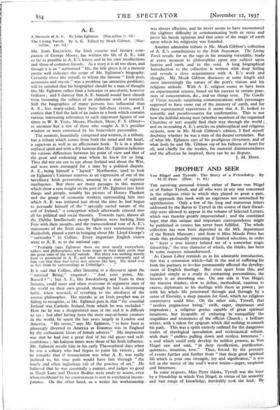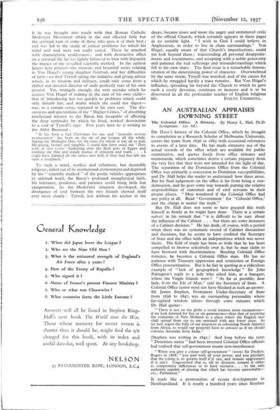PROPHET AND SEER
THE surviving personal friends either of Baron von Hugel or of Father Tyrrell, and all who were in any way concerned in the religious crisis in which they played so great a part, will approach this book with an eagerness not-untouched by apprehension. Only a few of the long and numerous letters addressed by the Baron to Tyrrell in the course of their friend- ship were allowed to appear in the volume of Selected Letters, which was thereby greatly impoverished ; and the contiaed hope that this unique and important correspondence might be published in extenso has never been fulfilled. The whole collection has now been deposited in the MS. department of the British Museum ; and from it Miss Maude Petre has made this profoundly interesting if limited selection, in order to " leave a true history behind me of a somewhat tragic friendship," the true character of which, she thinks, has been to some respects misunderstood.
As Canon Lilley reminds us in his admirable introduction, this was a connexion which—full in the end of suffering for both the partners. to it—has permanently affected the develop- ment of English theology. But even apart from this, and regarded simply as a study in contrasting personalities, the history is • an absorbing -one. On one -side is Von Hugel, the massive thinker, slow to define, methodical, cautious to excess, diplomatic in his dealings with those in power ; yet with his whole life penetrated through and through by a sense of Eternity, a deep passion for, God, which no religious controversy could blur. On the other side, Tyrrell, that ",restless pugnacious being," swift, eager, impetuous and imprudent ; a religious genius capable of great spiritual intuitions, but incapable of enduring in tranquillity the stupidities and resistances 9f the official Church ; a brilliant writer, with a talent for epigram which did nothing to smooth his path. This was a spirit entirely unfitted for the dangerous trades of theological speculation and ecclesiastical reform: with their "endless pulling down and restless bitterness " ; a soul which could only develop its noblest powers, as Von Hugel saw and said, "in deep recollection, purification, quietness, intuition, love." Thus, forced by the pressure of events further and further from " that deep great spiritual life which is your one strength, joy and significance," it was left at the mercy of the soul's worst toxins—anger, suspicion and bitterness.
In some respects, Miss Petre thinks, Tyrrell was the loser by a friendship in which Von Hugel, in virtue of his seniority and vast range of knowledge, inevitably took -the lead. By it he was brought into touch with that Roman Catholic Modernist Movement which in .the end effected little but the spiritual ruin of some of those who gave it of their best ; and was led to the study of critical problems for which his mind and soul were not really suited. These he attacked with characteristic recklessness ; and with destructive effect on a spiritual life far too lightly balanced to bear with impunity the impact of the so-called scientific method. In the earliest letters here printed—the intimate and beautiful series relating to Von Hugel's young daughter Gertrud, and her difficulties of faith—we find Tyrrell taking the initiative and giving advice which, in its wisdom and delicacy, could only come from a skilled and devoted director of souls perfectly sure of his own
ground. Yet, strangely enough, the very mistake which he accuses Von Hugel of making in the case of his own child— that of introducing her too quickly to problems which could only disturb her, and truths which she could not digest—
was, in a certain sense, repeated in his own case. The dis- cussions and speculations of the " Higher Critics," of absorbing intellectual interest to the Baron but incapable of affecting the deep certitudes by which he lived, worked destruction to a soul of Tyrrell's type. Five years later he is writing to the Abbe Bremond :
" It has been a bad Christmas for me, and lampades nostrae exstinguuntur ' has been on the tip of my tongue all the while. Saying the Midnight Mass for the nuns for whom it was all so real, life-giving, factual and tangible, I could fain have cried out ' Dare nobis de oleo vestro ' hankering after the flesh pots of Egypt and loathing the thin and windy manna of criticism and truth. . . . I could have damned all the critics into hell, if they had but left me such a receptacle."
To such a mind, restless and vehement, but incurably religious, jolted out of its institutional environment and deprived by the " scientific method " of the poetic vehicles appropriate
to spiritual truth, the Baron's profound metaphysical faith, his tolerance, prudence, and patience could bring little but exasperation. As the Modernist situation developed, the divergence of soul between the two friends showed itself ever more clearly : Tyrrell, lost without his anchor in the deeps, became more and more the angry and embittered critic of the official Church, which certainly appears in these pages in no amiable light. " I wish to God I could believe in Anglicanism, in order to live in clean surroundings." Von Hugel, equally aware of that Church's imperfections, could yet look beyond them ; transcending all personal disappoint ments and resentments, and accepting with a noble generosity and patience the real sufferings and misunderstandings which fell to his own share. The final issue is a remarkable demon- stration of the determining power of character. Overwhelmed by the same storm, Tyrrell was wrecked, and of the causes for which he struggled hardly a trace remains. But Von Hiigel's influence, spreading far beyond the Church to which he gave such a costly devotion, continues to increase and is to be discovered in all the profounder reaches of English religious















































 Previous page
Previous page